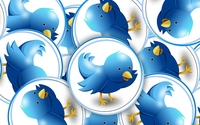
It's the morning where everyone in the media is asking one
another what the future holds for Twitter now that it has hit its tenth birthday. The sad truth for the social site beloved by the media and entertainment world is that if you or I make a pound more
than we spend today, we'll be doing better than Twitter.
It really is that simple. Despite the hype and the millions raised through the float followed by a new CEO followed by the return of
its founder, Jack Dorsey, Twitter just has not found a way of making more money than it spends. User numbers are flat lining and timelines are becomng more unmanageable. The social media site can make
you feel dizzy as dozens of posts are added to the average timeline every couple of minutes. It kind of feels like standing on a bridge over a busy road watching the cars dash by.
That's why I
think Twitter has had its last roll of the dice, and that was the final admission earlier this month that it cannot make money without becoming more like Facebook. The purists will scream -- or rather
hashtag -- from the highest highs, but there really is no option for Twitter other than to prioritise posts around popularity.
advertisement
advertisement
There are two reasons. For starters, it makes a feed far more
readable. I've already found more relevant news is at the top of my feed with people talking about what they're having for dinner rightly relegated to lower down the page. Secondly, it will make
brands think more creatively about what they put out on Twitter. Now that a post will only make it to the top of the page if it's popular, there's going to be a lot more effort put in to ensuring
engaging content is prioritised.
The knock-on effect of popularity is that you will see a lot more brands promoting a whole load more tweets to ensure they get visibility. That can only be a
good thing for Twitter's financials. Compare the commercial stance taken by Facebook and Twitter and the differences become clear. Only the occasional tweet is promoted next to a more regularly list
of promoted people that it's suggested we may like to follow. Facebook will have a carousel ad, or some other promotion, every time you scroll through with a right hand bar for ads. The routes for
Facebook to make money are simply far more obvious than they are for Twitter.
Now, Twitter purists will say that more advertising and tinkering with the timeline is annoying -- but user
numbers are flat-lining, so it's hard to see how Twitter has much to lose? Cleaning up feeds by priritising popularity over time and encouraging more brands to promote more tweets has to be the only
way it can ever deliver a profit back to grumbling shareholders. It's the classic dot-com story at the moment, in that the founders are the only people to have made money from Twitter. To avoid being
the next Myspace, advertising needs to be ramped up. Sure, some users will moan -- but let's face it, they're not paying for service anyway and numbers are not growing, so is it worth keeping people
who aren't making you any profit happy, or should you be forming a new strategy?
I don't think Twitter will go quite as far as Facebook. I can't see a right-hand ad column appearing, for
example, but with recent job cuts and streamlining combined with a strategy that encourages more advertising, I do think the company will begin to turn a profit this year. I doubt if this will live up
to the level of return initial investors were hoping for.
Twitter's next stage, I believe, will be a kind of bumping along just above the bottom, making enough money to keep going but never
delivering anything like what was imagined in those heady days of a Wall Street float. It doesn't have a great future, not an awful one, more a case of just bumbling along and doing "OK."